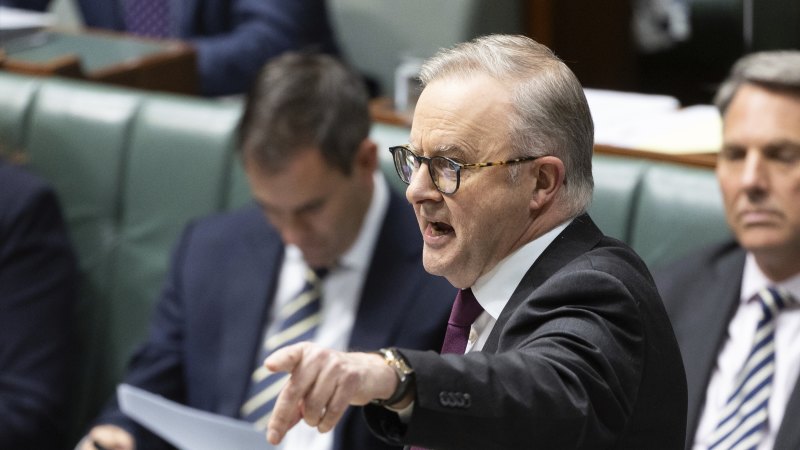Scope of COVID inquiry falls dangerously short

Save articles for later
Add articles to your saved list and come back to them any time.
It was March 16, 2020, when Premier Daniel Andrews first declared a state of emergency in response to a new virus, now known as COVID-19. At the time, few could have imagined the ramifications of that decision.
Rarely, if ever, has government been granted such extraordinary power over how people go about their lives. Large swaths of the economy were shut down, schools closed, and severe restrictions placed on people’s movements. Thousands of difficult decisions had to be made, with advice by then-chief health officer Brett Sutton, often under intense time pressure. There was no road map for this type of scenario.
Anthony Albanese has ducked the decision to hold a royal commission, a structure that would have forced the disclosure of evidence from politicians and officials.Credit: Alex Ellinghausen
The stakes could not have been higher. More than 8400 Victorians have died with COVID-19, and many thousands are living with the long-term health impacts of the virus.
There is no doubt that governing during the pandemic was vexed, and that our governments were, by and large, doing their best to protect people. But mistakes were made. The aged care sector was devastated by COVID-19 outbreaks. The initial setting up of hotel quarantine in Victoria was a debacle.
It’s for those reasons The Age has long advocated for a thorough, transparent and independent inquiry across all levels of government. We believe the most fit-for-purpose means of carrying out such an investigation would be a royal commission.
What Prime Minister Anthony Albanese offered up this week fell well short of this.
Labor’s inquiry panel comprises a public service expert, an epidemiologist and a health economist. It has 12 months to probe the Commonwealth’s response to the pandemic and make recommendations on how Australia can better prepare for similar events.
It will review the provision of vaccinations, treatments and key medical supplies to Australians, the role of national cabinet, mental health support for those impacted by COVID-19 and lockdowns, financial support for individuals and business, and assistance for Australians abroad.
But while prominent epidemiologist Catherine Bennett, one of three experts leading the inquiry, said the panel would “absolutely” seek to hear from state and territory leaders, the most life-altering decisions the leaders made – which include school shutdowns, border closures, curfews and vaccine mandates – will fall outside the inquiry’s scope. It’s no wonder Andrews and former NSW Liberal premier Dominic Perrottet are happy to appear before the inquiry.
In other words, the inquiry’s major focus will only be on the decisions and actions made by the former Coalition government, led by Scott Morrison. The brazen political nature of this inquiry is clear for all to see.
As The Age’s chief political correspondent, David Crowe, pointedly wrote this week: “This review looks too shallow, too brief and too controlled by its political master to answer the big questions for Australians about decisions that changed millions of lives during the COVID-19 emergency”. Opposition Leader Peter Dutton has accused Albanese of making a “deliberate decision to put the interests of Labor premiers ahead of our national interest, and that is a shameful act”.
Albanese was not always so shy about the possibility of kicking off a royal commission. When he fronted the National Press Club early last year, before being elected, he said it was “beyond doubt” that “a royal commission or some form of inquiry” into the nation’s handling of the COVID-19 pandemic needed to happen.
This strongly implied that any future inquiry under his government would have the powers and scope to cover all aspects of the crisis. It clearly does not.
The need for a royal commission was supported last year by a Senate COVID-19 committee chaired by Labor Finance Minister Katy Gallagher. She was clear that some questions would not be answered without a royal commission’s powers to compel witnesses and produce documents. As she said at the time, it’s important to understand “who was advising, what they were advising, whether the government took that advice at critical parts of the pandemic”.
That is not the inquiry we now have. That is the inquiry we need, though, if we are to truly prepare ourselves for the next pandemic.
With Labor in government across the mainland states, the prime minister has chosen the less effective option of avoiding doing anything that might poke his state colleagues in the eyes.
It sits uncomfortably against the plethora of recent royal commissions into child sexual abuse, banking, aged care, veteran suicide, robo-debt and natural disaster arrangements. Every one of them has been effective at uncovering uncomfortable truths, shaping government policy and offering constructive mechanisms to ensure mistakes are not repeated.
The COVID-19 pandemic involved the most complex and costly government effort since World War II. For state governments not to be held accountable by a comprehensive retrospective assessment is unfathomable. A royal commission must be part of the process of looking back and learning the lessons of the past. Parts of it will be painful, but it will surely also reveal actions that should and will attract praise and appreciation.
It was more than 100 years since a global pandemic on the devastating scale of COVID-19 had taken place. There is no guarantee the next one will take so long. A royal commission would be an invaluable tool in ensuring that when a pandemic does strike again, lessons are well learnt and lives saved.
Anything less than a full examination of the pandemic response leaves us vulnerable to disaster.
Patrick Elligett sends an exclusive newsletter to subscribers each week. Sign up to receive his Note from the Editor.
Most Viewed in Politics
From our partners
Source: Read Full Article
